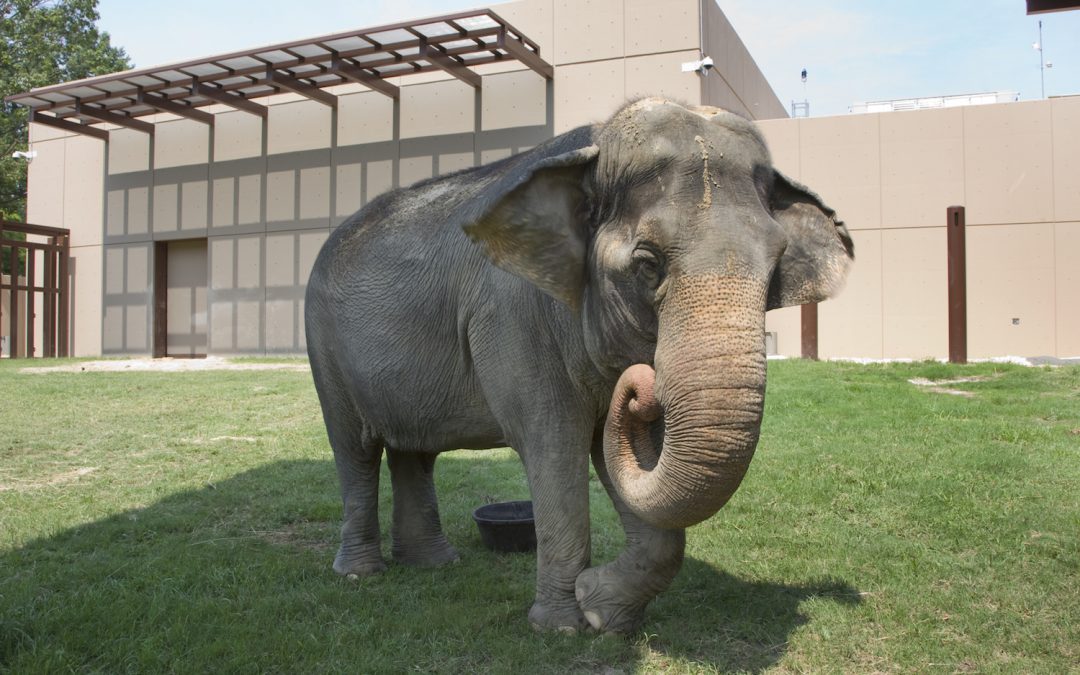WASHINGTON — On Saturday, Ambika will celebrate her 70th birthday like most of us do: with cake and surrounded by friends.
She’ll reach for her cake — a mix of ice and tropical fruit — with a speckled trunk, during her celebration at the Smithsonian’s National Zoo. The 6,853-pound soon-to-be septuagenarian is one of the oldest Asian elephants in the United States.
“Seventy is a huge milestone for her, for any elephant, and so we’re happy about that,” said Tony Barthel, the zoo’s elephant curator. “We’re using this to highlight both her birthday, and then the reverse, to highlight elephant issues using her story.”
Ambika’s birthday coincides with World Elephant Day, which was established in 2012 to raise awareness to the issues plaguing both Asian and African elephants. In light of the day, zoos across the country will host educational and advocacy events, ranging from a behind-the-scenes barn tour at the Los Angeles Zoo, to a Facebook live session with Zoo Atlanta and an elephant water salute at Zoo Miami.
“The unfortunate reality is that most people will not get an opportunity to go to Africa, go to Asia and see [elephants] in the wild,” said Ron Magill, the spokesperson for Zoo Miami. The zoo has two Asian elephants and four African elephants, dubbed “The Golden Girls” because they are all females in their 40s. “A zoo like our zoo presents the only window where people can actually get that eye-to-eye contact with these animals. World Elephant Day gives us an opportunity to focus on that, to spotlight the elephant, raise awareness about it and make people care.”
Both Asian and African elephants face threats from poaching and habitat loss. While an estimated 100,000 Asian elephants existed at the start of the 20th century, the numbers have dropped by at least 50% and continue to decline, according to the World Wildlife Foundation. Likewise, African elephants are believed to have dropped in number from 3-5 million to around 415,000.
Protecting elephants is especially important as they are considered to be an “umbrella species,” meaning that their conservation in turn protects other species in the area. “Once you start to care about elephants and you start working on elephant conservation, you’re also impacting warthogs and dung beetles and countless plant species,” said Stephanie Braccini, the curator of mammals at Zoo Atlanta. “Not everyone out there is going to be a salamander fanatic, but by helping elephants, you’re helping so many other species that we just don’t think about.”
For many zoos, World Elephant Day is a chance to engage visitors through activities that expand upon the typical visit. At Zoo Atlanta, an activity will try to replicate how it feels to paint like an elephant, by having visitors reach out with one hand and their eyes closed.
“It gets you engaged and thinking about why would an elephant have a trunk? And what are the benefits of it?” said Braccini. “Anything that gets you engaged and caring about a species really drives that conservation action.”
In addition to talks with elephant keepers, many zoos will also let visitors go behind the scenes, as places like the Los Angeles Zoo open up their barns to the public over the weekend. “Visitors can tour the barn and learn a lot about how we care for our elephants … from checking up on their health to taking care of their feet,” said zoo spokesperson Kait Hilliard.
Another key aspect is highlighting and supporting conservation work that happens beyond just World Elephant Day. For example, the Smithsonian’s National Zoo and Conservation Biology Institute uses satellite technology to track Asian elephants in Myanmar, where habitat loss has led to an increase in human-elephant conflict. “By putting on a GPS device you can basically continuously learn what this elephant does and where it moves,” said conservation biologist Peter Leimgruber.
Through the tracking, the team discovered that severe poaching is occurring. “We discovered that they’re not being poached for ivory; they’re being poached for skin. This is a completely new thing,” he said.
While the Smithsonian’s research focuses on Asian elephants, the Wildlife Conservation Society, which operates the Bronx Zoo, works to protect African elephants through their 96 Elephants campaign. They have a series of events planned leading up to World Elephant Day, and kicked it off by crushing nearly 2 tons of confiscated ivory in Central Park on August 3.
“[Elephants] are some of the most charismatic and iconic species. They mourn their dead, they’re matriarchal societies, they’re incredibly intelligent,” said John Calvelli, the director of the 96 Elephants campaign. “World Elephant Day gives us this chance to celebrate this incredible iconic species that we share the planet with, and also to have people reflect on the responsibility that they have to make sure that [elephants] have a future on this planet with us.”


